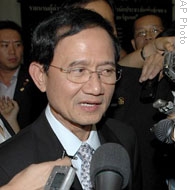-
(单词翻译:双击或拖选)
 |
| Thailand's Prime Minister Somchai Wongsawat talks with reporters in Chiang Mai province, northern Thailand, 26 Nov 2008 |
Prime Minister Somchai Wongsawat's Cabinet made the decision to impose emergency law at the airports in a meeting Thursday in the northern city of Chiang Mai.
Thousands of protestors led by the People's Alliance for Democracy occupy the international and domestic airports at Bangkok, halting all flights.
Kudeb Saikrajang, a spokesman for the governing People's Power Party (PPP), says the plan is to create an emergency zone around the airports. The question, however, is whether security forces will enforce the decision.
"The government has to order the law enforcement officers to do their duty to clear the area. But whether the law enforcement officers will do their duty by the order of the government - I don't know," Kudeb said.
The PAD leaders ignored calls by the prime minister and the Thai army chief to end the occupation of the international airport, which began Tuesday, and the blockade of the domestic airfield3, which started Thursday.
The army chief also has called on the prime minister to dissolve parliament and call new elections, which Mr. Somchai says he will not do.
Thousands of passengers have had travel plans disrupted. The Thai news media and members of the tourism industry have widely criticized the PAD.
But PAD spokesman Parnthep Pourpongpan says the occupation will continue until the prime minister resigns. Mr. Somchai rejects that demand, saying his government is democratically elected.
"We don't worry about [the public backlash] because we follow the constitution - we still have a right to continue our rally peacefully. That is what we are doing - we are going to fight for," Parnthep said.
The government also says the situation may force it to cancel the annual meeting of the leaders of the Association of Southeast Asian Nations. The meeting is to be held next month in Chiang Mai.
The PAD's steadfast4 stance adds to fears of increasing clashes with government supporters. In recent days several small explosions have occurred in Bangkok and there have been sporadic5 battles between groups. Small blasts at a PAD compound in the city have killed two protesters and injured scores.
Many political analysts6 and Thai citizens express fear that violence would push the military to step in, leading to widespread bloodshed or a takeover.
The PAD accuses Mr. Somchai of acting7 as a proxy8 for his brother-in-law, former Prime Minister Thaksin Shinawatra. He was ousted9 in a coup10 two years ago after being accused by the urban middle class of corruption11 and authoritarianism12. Mr. Thaksin fled Thailand in August just before a court sentenced him to two years in jail for corruption.
But he remains13 popular with the urban working class and in rural areas because of his populist economic policies.
 收听单词发音
收听单词发音
1
opposition

|
|
| n.反对,敌对 | |
参考例句: |
|
|
|
2
deadlock

|
|
| n.僵局,僵持 | |
参考例句: |
|
|
|
3
airfield

|
|
| n.飞机场 | |
参考例句: |
|
|
|
4
steadfast

|
|
| adj.固定的,不变的,不动摇的;忠实的;坚贞不移的 | |
参考例句: |
|
|
|
5
sporadic

|
|
| adj.偶尔发生的 [反]regular;分散的 | |
参考例句: |
|
|
|
6
analysts

|
|
| 分析家,化验员( analyst的名词复数 ) | |
参考例句: |
|
|
|
7
acting

|
|
| n.演戏,行为,假装;adj.代理的,临时的,演出用的 | |
参考例句: |
|
|
|
8
proxy

|
|
| n.代理权,代表权;(对代理人的)委托书;代理人 | |
参考例句: |
|
|
|
9
ousted

|
|
| 驱逐( oust的过去式和过去分词 ); 革职; 罢黜; 剥夺 | |
参考例句: |
|
|
|
10
coup

|
|
| n.政变;突然而成功的行动 | |
参考例句: |
|
|
|
11
corruption

|
|
| n.腐败,堕落,贪污 | |
参考例句: |
|
|
|
12
authoritarianism

|
|
| 权力主义,独裁主义 | |
参考例句: |
|
|
|
13
remains

|
|
| n.剩余物,残留物;遗体,遗迹 | |
参考例句: |
|
|
|















